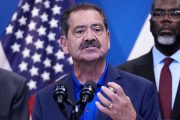While on a campaign swing through Ohio, President Barack Obama sat down with Fox 19 reporter Ben Swann to discuss a variety of national security and constitutional issues.
Swann is an investigative journalist known for his analysis segment called Reality Check. His reports have covered everything from the rules-approval scandal at the recent Republican National Convention to the indefinite detention of Americans as authorized by the National Defense Authorization Act (NDAA).
The interview begins with Swann asking the president why his administration is fighting an injunction issued by a federal judge prohibiting the indefinite detention of American citizens under Sections 1021 and 1022 of the NDAA for 2011.
“My first job is to keep the American people safe,” Obama responds.
There are two problems immediately apparent in the president’s answer.
First, keeping the American people safe is not the president’s job. Article II Section 1 of the U.S. Constitution spells out the presidential oath of office. The oath taken by the president commits him to the best of his ability to “preserve, protect, and defend the Constitution of the United States.”
Signing acts purporting to grant himself the power to send American troops to detain and indefinitely imprison American citizens without being charged with a crime or tried on the merits of those charges is not how the Constitution should be preserved, protected, or defended. In fact, it is a reprehensible way to ignore and violate our founding document.
The second problem with the president’s answer to Swann’s question is that it is no answer at all. Swann did not ask the president to tell him what a president should do; he asked him why the president’s lawyers were fighting to have the indefinite detention sections of the NDAA declared constitutional.
President Obama goes on to say that such weapons should remain in his arsenal because there are “some bad guys that cannot be tried in a conventional court.”
Why can these “bad guys” — assuming he means terrorists — not be tried in our federal court system? For decades those accused of terroristic crimes have been formally charged with those crimes, had those charges heard before an impartial federal judge, and been permitted to mount a defense to those crimes.
In fact, a survey of such trials conducted by the Human Rights Watch reports, “Federal civilian criminal courts have convicted nearly 500 individuals on terrorism-related charges since 9/11.”
And lest the president suggest that they cannot be apprehended, he should be reminded that “public enemy number one” and former baddest of the bad guys, Osama bin Laden, was reportedly tracked and caught by a U.S. special operations team. Why could other less high-value targets not be similarly caught? Then, once in the custody of the United States, they could be brought to stand trial for their alleged evil deeds. This would preserve, protect, and defend the fundamental concept of due process, one of the pillars of liberty upon which our Constitution is built.
Swann then moves on to ask the president about the infamous “kill list,” the list of people targeted for assassination. Despite the president’s earlier comments claiming that Americans would not be the target of indefinite detention, Swann reminds the president that an American citizen was on the list and was killed by a Hellfire missile launched from a Predator drone.
Anwar al-Awlaki found himself on the kill list after he was suspected of influencing the Ft. Hood shooter, Major Nidal Hasan, as well as the so-called Underwear Bomber, Umar Abdulmutallab. Despite the fact that he was targeted for execution, no official charges were ever filed against the American-born cleric. In fact, neither the military nor the CIA ever attempted to apprehend him, much less try him for his alleged atrocities. Simply put, he was placed on a proscription list and murdered.
The hit reportedly went down like this: On September 30, 2011, while Awlaki was eating breakfast, two unmanned Predator drones fired Hellfire missiles, killing him.
Perhaps more unconscionable than his death was the death of his 16-year-old son two weeks later. Abdulrahaman al-Awlaki was killed in a drone strike as well, after also being targeted for assassination.
No charges. No trial. No due process. While it is true that the senior Awlaki spewed hateful rhetoric that could have been seen as inciting, his teenage son was guilty of nothing but being associated with one who was allegedly associated with those allegedly associated with al-Qaeda.
It is this guilty-by-association followed by death-by-drone that rightly worries many constitutionalists and friends of liberty. When the president usurps the power to place names on a kill list and then have those people summarily executed without a trial, he has placed our Republic on a trajectory toward tyranny and government-sponsored terrorism.
Specifically, President Obama dodges the question by informing Swann that he “can’t comment on something as specific as you just mentioned [the kill list and the targeting of American citizens].”
This is hedge with a huge hole it in. The New American has chronicled President Obama’s zeal for signing executive orders claiming to give him a wide range of unprecedented powers, but when it comes to giving satisfying answers to difficult questions, he ignores one such order that allows him to do just that.
As pointed out by Micah Zenko on his “Politics, Power, and Preventative Action” blog:
President Obama could comment on this crucial matter if he chose. The president has the authority to declassify anything that he wants, as spelled out in Executive Order 13526. It is remarkable that Obama is unwilling to answer this question since thirty-three months have passed since he first authorized the killing of a U.S. citizen, twenty-seven months since the Office of Legal Counsel memo that justified that targeted killing was completed, and eleven months since Anwar al-Awlaki was killed.
Next, Swann asks President Obama why, if al-Qaeda is our sworn enemy and an “ongoing threat to the national security of the United States,” is his administration sending millions of dollars to the Syrian rebel armies when so many of their leaders are known al-Qaeda operatives.
“Syria’s a tough situation,” the president answers. He explained that he is committed to “a broad foreign policy” that will only provide “non-lethal assistance” to Syrian opposition forces without a “jump right in to a civil war.”
Again, his answer does not explain the hypocrisy regarding his purported goal of eliminating al-Qaeda and their associates.
Think of it this way: In World War II the United States was not bombing the armies of the Third Reich occupying France while simultaneously sending Hitler money and supplies to help him conquer Russia. But that is precisely the baffling policy of the government of the United States as pertains to al-Qaeda throughout this now 11-year “War on Terror.”
This inexplicable contradiction is hardly an example of the “common sense, practical” foreign policy touted by the president in his interview with Swann.
Ben Swann is to be commended for his worthwhile attempt to nail the president down on some examples of his frequent assaults on our Constitution and the fundamental freedoms that have blessed Americans and our ancestors for nearly a thousand years.
Photo of President Obama at top: AP Images




